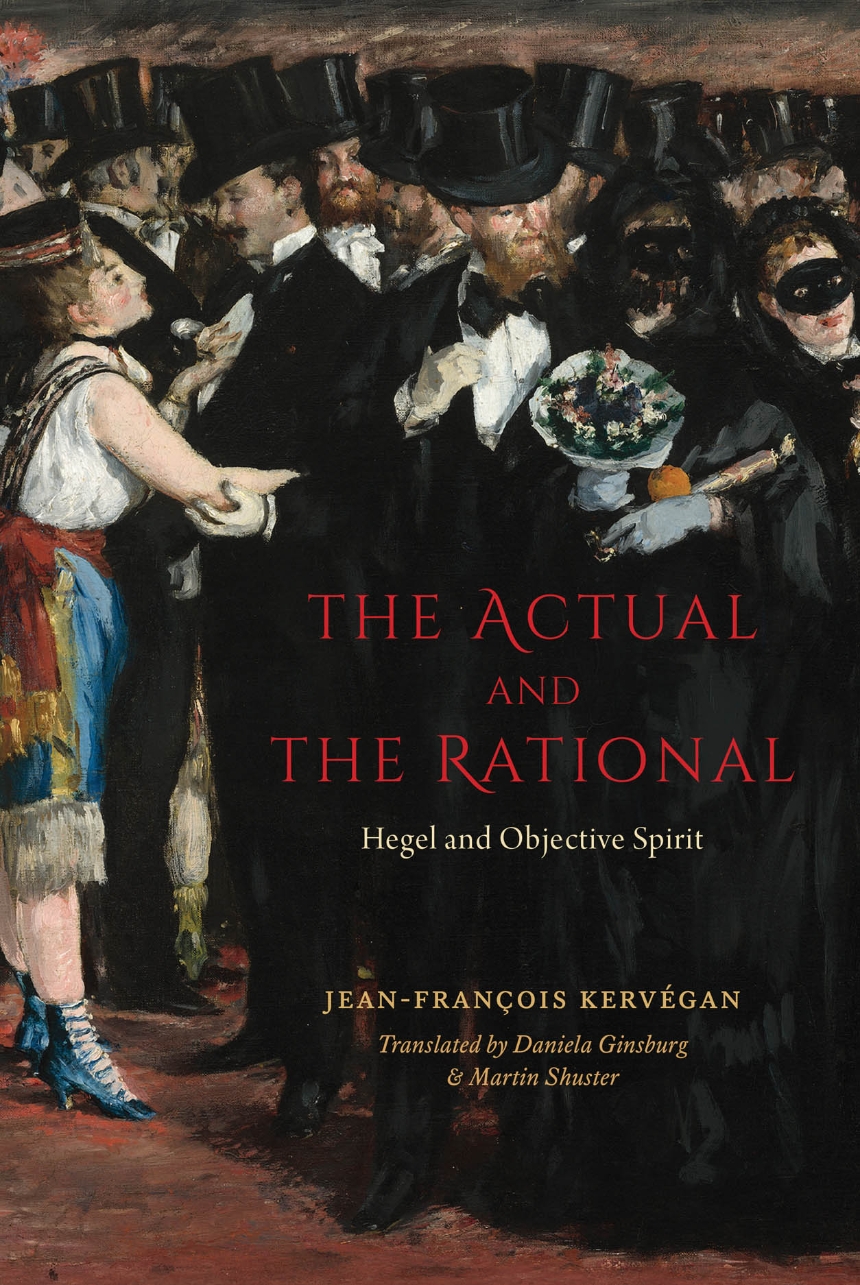The Actual and the Rational
Hegel and Objective Spirit
One of Hegel’s most controversial and confounding claims is that “the real is rational and the rational is real.” In this book, one of the world’s leading scholars of Hegel, Jean-François Kervégan, offers a thorough analysis and explanation of that claim, along the way delivering a compelling account of modern social, political, and ethical life.
Kervégan begins with Hegel’s term “objective spirit,” the public manifestation of our deepest commitments, the binding norms that shape our existence as subjects and agents. He examines objective spirit in three realms: the notion of right, the theory of society, and the state. In conversation with Tocqueville and other theorists of democracy, whether in the Anglophone world or in Europe, Kervégan shows how Hegel—often associated with grand metaphysical ideas—actually had a specific conception of civil society and the state. In Hegel’s view, public institutions represent the fulfillment of deep subjective needs—and in that sense, demonstrate that the real is the rational, because what surrounds us is the product of our collective mindedness. This groundbreaking analysis will guide the study of Hegel and nineteenth-century political thought for years to come.
Kervégan begins with Hegel’s term “objective spirit,” the public manifestation of our deepest commitments, the binding norms that shape our existence as subjects and agents. He examines objective spirit in three realms: the notion of right, the theory of society, and the state. In conversation with Tocqueville and other theorists of democracy, whether in the Anglophone world or in Europe, Kervégan shows how Hegel—often associated with grand metaphysical ideas—actually had a specific conception of civil society and the state. In Hegel’s view, public institutions represent the fulfillment of deep subjective needs—and in that sense, demonstrate that the real is the rational, because what surrounds us is the product of our collective mindedness. This groundbreaking analysis will guide the study of Hegel and nineteenth-century political thought for years to come.
Translated by Daniela Ginsburg and Martin Shuster
416 pages | 6 x 9 | © 2018
Philosophy: General Philosophy, Philosophy of Society, Political Philosophy
Reviews
Table of Contents
Preface: Hegel without Metaphysics?
Prologue: The Actual and the Rational
PART I
The Law: The Positivity of Abstraction
Preliminary: The Objectivity of Willing
1 Law: Its Concept and Actualizations
2 Between Nature and History: The Law
3 Contract: The Legal Conditions of the Social
PART II
The Vitality and Flaws of the Social
Preliminary: The Archeology of Society
4 “Citoyen” versus “Bourgeois”? The Quest for the “Spirit of the Whole”
5 The State of Law: Civil Society
6 “Ethicality Lost in Its Extremes”
PART III
The State and the Political
Preliminary: The Enduring Myth of the Philosopher of the Prussian State
7 Tocqueville-Hegel: A Silent Dialogue on Modernity
8 A Theory of Representation
9 Beyond Democracy
PART IV
Figures of Subjectivity in Objective Spirit: Normativity and Institutions
Preliminary: Strong and Weak Institutionalism
10 The Truth of Morality
11 The Conditions of Political Subjectivity
12 Subjects, Norms, and Institutions: What Is an Ethical Life?
Epilogue: The Passion of the Concept
Translator’s Note
Bibliography
Index
Prologue: The Actual and the Rational
PART I
The Law: The Positivity of Abstraction
Preliminary: The Objectivity of Willing
1 Law: Its Concept and Actualizations
2 Between Nature and History: The Law
3 Contract: The Legal Conditions of the Social
PART II
The Vitality and Flaws of the Social
Preliminary: The Archeology of Society
4 “Citoyen” versus “Bourgeois”? The Quest for the “Spirit of the Whole”
5 The State of Law: Civil Society
6 “Ethicality Lost in Its Extremes”
PART III
The State and the Political
Preliminary: The Enduring Myth of the Philosopher of the Prussian State
7 Tocqueville-Hegel: A Silent Dialogue on Modernity
8 A Theory of Representation
9 Beyond Democracy
PART IV
Figures of Subjectivity in Objective Spirit: Normativity and Institutions
Preliminary: Strong and Weak Institutionalism
10 The Truth of Morality
11 The Conditions of Political Subjectivity
12 Subjects, Norms, and Institutions: What Is an Ethical Life?
Epilogue: The Passion of the Concept
Translator’s Note
Bibliography
Index
